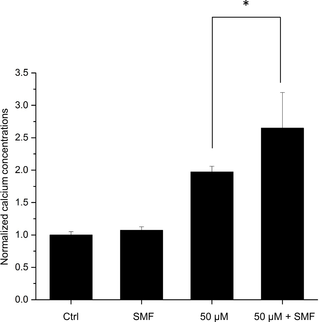PLOS ONE ( IF 2.9 ) Pub Date : 2018-01-16 , DOI: 10.1371/journal.pone.0191078 Wei-Ting Chen , Guan-Bo Lin , Shu-Hui Lin , Chueh-Hsuan Lu , Chih-Hsiung Hsieh , Bo-Lun Ma , Chih-Yu Chao

|
Static magnetic field (SMF) has shown some possibilities for cancer therapies. In particular, the combinational effect between SMF and anti-cancer drugs has drawn scientists’ attentions in recent years. However, the underlying mechanism for the drug-specific synergistic effect is far from being understood. Besides, the drugs used are all conventional chemotherapy drugs, which may cause unpleasant side effects. In this study, our results demonstrate for the first time that SMF could enhance the anti-cancer effect of natural compound, capsaicin, on HepG2 cancer cells through the mitochondria-dependent apoptosis pathway. We found that the synergistic effect could be due to that SMF increased the binding efficiency of capsaicin for the TRPV1 channel. These findings may provide a support to develop an application of SMF for cancer therapy. The present study offers the first trial in combining SMF with natural compound on anti-cancer treatment, which provides additional insight into the interaction between SMF and anti-cancer drugs and opens the door for the development of new strategies in fighting cancer with minimum cytotoxicity and side effects.
中文翻译:

静磁场通过辣椒素受体TRPV1增强辣椒素对HepG2细胞的抗癌作用
静磁场(SMF)已显示出一些用于癌症治疗的可能性。特别是近年来,SMF和抗癌药的联合作用引起了科学家的关注。但是,对于药物特异性协同作用的潜在机制尚不清楚。此外,所用药物均为常规化学疗法药物,可能引起不良的副作用。在这项研究中,我们的结果首次证明了SMF可以通过线粒体依赖性凋亡途径增强天然化合物辣椒素对HepG2癌细胞的抗癌作用。我们发现协同效应可能是由于SMF增加了辣椒素对TRPV1通道的结合效率。这些发现可能为开发SMF在癌症治疗中的应用提供支持。









































 京公网安备 11010802027423号
京公网安备 11010802027423号